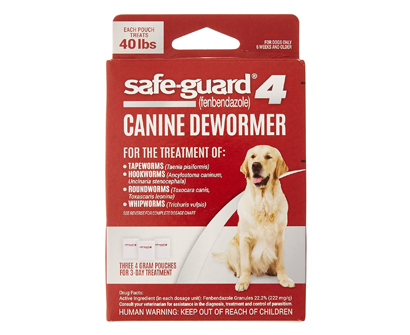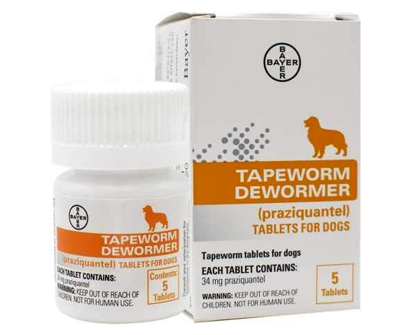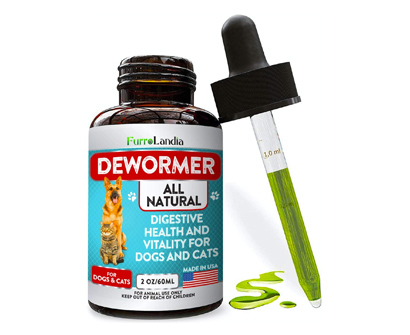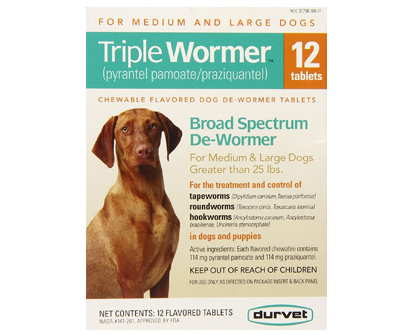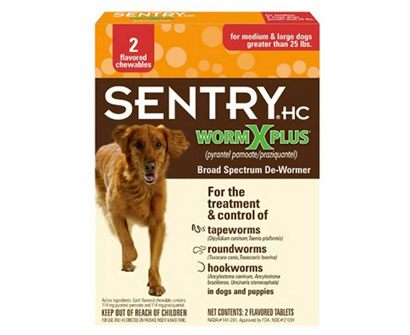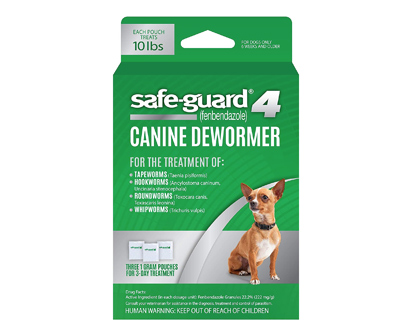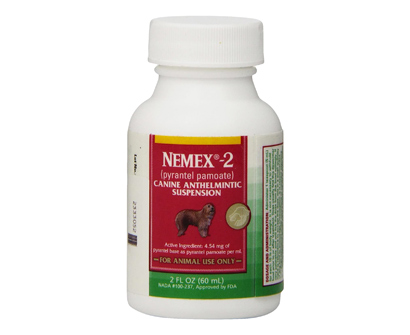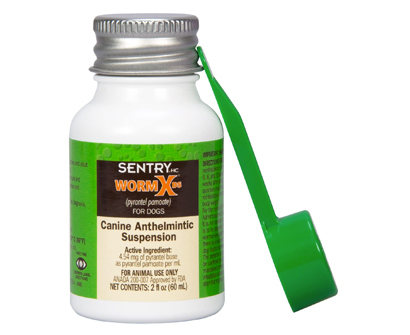The Best Dewormers for Dogs in 2022

By their nature, dogs are into everything and it can be near on impossible to keep them away from any yucky stuff. The downside of this behavior is that they can go on to pick up something even yuckier – worms. A worm infestation is one of the most common ailments to affect dogs and while the symptoms are often mild, they can go on to become pretty sick. And some worms can actually cause serious harm to your pooch if left untreated.
While prevention is always the best option, there are times when your dog is going to going to pick up a dose of worms, which is why a regular worming program is essential. But if you suspect your pet already has worms, then a fast-acting treatment is needed. We take a look at the products currently on the market that are both effective and safe for your pet. Here’s our review of what we think are the 10 best dewormers for dogs you can buy.
The Best Dewormer for Dog
1. Safe-Guard Canine Dewormer
Key Features
Works against roundworm, hookworm and whipworms
Treats one type of tapeworm – Taenia species
Three-day treatment gives six months protection
Can be used on puppies from six weeks
Containing the active ingredient, fenbendazole, our Best Choice is the easy to administer Safe-Guard Canine Dewormer. Available as a three-day treatment, Safe-Guard works to treat and control four types of parasites – tapeworms, roundworms, hookworms and whipworms – and can be used on dogs over the age of six weeks. It does only treat one type of tapeworm – Taenia pisiformis – so if you suspect your pooch has another tapeworm variant, chat to your vet. But as an all-round treatment, fenbendazole is one of the safest and most effective you can get. We like the granule formula of the SafeGuard dewormer, as it’s easy to mix into their food, making it a good choice for puppies who may struggle with or resist a tablet treatment. Plus, it can also be used on pregnant or heart-worm infected dogs. Given over three consecutive days, you get six months’ worm protection and there is enough dosage supplied for dogs weighing up to 40 pounds.
2. Bayer Tapeworm Dewormer
Key Features
Active ingredient is praziquantel
Single dosage treatment
Contains five 34mg tablets
Worms on the common tapeworms
If you know that tapeworm is the issue, then go straight for a targeted treatment. And this fact-acting tapeworm buster from Bayer should do the trick. The active ingredient is praziquantel pyrantel, which is known to be effective against the most common tapeworms, Dipylidium caninum and Taenia taeniaeformis but is gentle enough to be used on young dogs over the age of four weeks, so a good dewormer for puppies. Depending on your pet’s weight, just one dose is needed to get results, and with five tablets per pack, there’s enough to keep your regular deworming program on track. Administering these dog wormer pills should be easy too, thanks to the solid formulation that can also be easily crushed and crumbled into your pooch’s food.
3. FurroLandia All Natural Dewormer
Key Features
All-natural broad-spectrum dewormer
Effective against hook, round, whip and tapeworms
Includes black walnut, cloves and wormwood
Safe for puppies as well as senior dogs
If you are looking for a more natural way to tackle a worm infestation or to keep your pooch worm free, then this all-natural dewormer from FurroLandia could well be the option for you. As a digestive cleanse for both dogs and cats, there are no harsh chemicals, just a host of natural ingredients in a broad-spectrum formula that targets any parasites and works to support a healthy digestion. Inside the liquid formula you have a natural powerhouse of ingredients, including pumpkin seed, cloves, black walnut, wormwood and apple cider vinegar, all know to be the scourge of parasites including hook, round, whip and tapeworms while helping to support and heal the digestive system. Safe for pups as well as senior dogs and GMO-free, this natural dewormer is also easy to administer, and can be used as a treatment as well as a preventative measure against further infestations.
4. Durvet Triple Wormer
Key Features
Pyrantel pamoate (114mg) and praziquantel (114mg)
Tackles tapeworms, hookworms and roundworms
Formulated for medium/large dogs over 12 weeks
Flavored chewable tablets – 12 pack
Our Premium Pick is this broad spectrum dewormer from Durvet that’s easy to administer, thanks to the chewable tablets formula. The active ingredients are roundworm and hookworm-busting pyrantel pamoate alongside praziquantel, known to be effective against tapeworms. Available in a bumper 12 chewable tablets pack, you get enough to deliver your dog’s ongoing worming program, with extra if you need more doses. Formulated for medium and large dogs over 25 pounds, there’s also a separate lower dosage product for small dogs and puppies over 12 weeks. Chewable and flavored to entice your pet, this Triple Wormer is fast acting although the initial recommended dose is two tablets (depending on your dog’s weight), repeated after two weeks. You can then use this worm treatment for dogs as a maintenance dose to keep your pup happy and free of intestinal parasites.
5. Sentry HC Worm X Plus
Key Features
Active ingredients: pyrantel pamoate and praziquantel
Kills seven strains of tape, hook and roundworm
Each chewable tablet offers one month’s protection
For dogs over 25 pounds
For when you need a super-fast-acting dewormer that’s kind and gentle on your dog, we think Sentry HC’s WormX Plus is a good choice. You get an impressive broad spectrum dewormer in easy to administer, chewable tablets that bring together two of the most effective ingredients, Pyrantel pamoate and praziquantel. Together, this combination works to rid your pet of seven of the most common strains of worms, including two types of tapeworm, two of roundworm and three hookworms. Formulated for medium to large sized dogs, the main downside to this effective wormer is that it’s protection only lasts a month before you need to re-dose, unlike some other dewormers in our review, which can go up to six months between treatments.
6. SafeGuard 4 Canine Dewormer
Key Features
Treats tape, round, hook and whipworms
Uses the active ingredient, fenbendazole
Safe for puppies from six weeks
Powder form – fast-acting three-day supply
This well-priced canine dewormer from SafeGuard is effective against the main four – tape, round, hook and whipworms – and is effective for up to six months. It is also safe enough for puppies from the age of six weeks as well as pregnant or heartworm infected dogs. In an easy to administer granular powder, you simply need to add a daily dose to your pet’s food over three consecutive days to get the protection your dog needs. Using the veterinary proven active ingredient, fenbendazole, you do need to carefully weigh your dog to get the correct daily dosage, but the results are quick thanks to the highly effective formula. And the three-day pack should supply all the dewormer you need to treat dogs up to 80 pounds.
7. Nemex 2 Canine Anthelmintic Suspension
Key Features
Removes large roundworms and hookworms
Contains pyrantel pamoate
Liquid suspension with a caramel flavor
Can be used on puppies from two weeks
Nemex-2 can be used for very young puppies and the liquid suspension is easy to administer, either directly or poured onto their food. With pyrantel pamoate as the active ingredient, this dewormer works against large roundworms and hookworms and is safe enough to be used monthly for heavy infestations. For pups from two weeks of age, Nemex-2 is also safe for lactating or pregnant dogs as well as adult and more senior dogs, with a dosage based on one teaspoon per 10 pounds of weight. The makers Pfizer have also made the suspension palatable for your pooch, thanks to the delicate caramel flavor and you get a decent value two-ounce bottle, meaning the dewormer can also be used as a regular prevention treatment.
8. Sentry HC Worm X DS for Dogs
Key Features
Liquid suspension for easy use
Pyrantel pamoate to tackle round and hookworms
Add to food or administer direct
One teaspoon per 10 pounds of bodyweight
If you are impressed with the Sentry HC WormX tablets but your dog is not so enamored, then giving this liquid suspension version is certainly worth a try. Formulated to specifically tackle large roundworms and hookworms, WorkX liquid suspension uses Pyrantel pamoate as its fast-acting active ingredient, getting to the heart of your pet’s parasite problem. The 60ml bottle is good value as the dose is based on your pet’s weight and can be used as a one-off treatment or as part of your dog’s regular worming prevention plan. And while WormX is tough on those hook and roundworms, it is gentle for your pet, and is safe enough to be used on small dogs and very young pups as well as lactating canine mums. The only downside is that it is quite a thin liquid so can be a bit messy when administering or adding to their food but getting a pipette squeezer should do the trick.
Best Dog Dewormer Buying Guide & FAQ
What are the Symptoms of Worms in Dog?
Spotting the symptoms of worms in your dog is not always easy, especially in the early days of the infestation. And some symptoms are peculiar to the type of worm your pooch has. Threadworms, for example, can irritate your pet’s anus, leading to a ‘scooting’ action as they rub their butt across the ground. Some of the other symptoms of a worm infestation in your pet can include:
- Visible worms in your dog’s poop, vomit, or around their bottom
- Diarrhea and vomiting
- Blood in their stools
- Lethargy and low mood; poor coat condition
- Weight loss, even if they seem to have a good appetite
- An unusually swollen tum
- Scratching at their bottom
- Coughing and bleeding (a possible sign of lungworm)
- Anemia, pale gums, extreme tiredness (possible symptoms of heartworm).
If you are concerned about any of the above symptoms in your dog, it is a wise move to have a chat with your vet as they can help to identify what type of intestinal worms your dog may have.

What Types of Worms Affect Dogs?
Dogs are inquisitive, active creatures and they can pick up a worm infestation in several ways. The main routes to a worm problem come from your dog eating things he shouldn't, particularly dead animals or animal droppings, having fleas which can carry worm larvae, and in the case of lungworm, from contact with slugs and snails. Puppies can also pick up worms from their mother’s milk when nursing.
There are six types of worms that can affect your dog:
Roundworms – these are the most common intestinal parasite in dogs and there are two types: Toxocara canis, which is more prevalent in puppies and can actually be transferred to humans, and Toxascaris leonine. Pups can pick up roundworms in their mother’s milk while other dogs can pick up roundworms from eating contaminated rodents, their droppings, or from the soil. Roundworms can be identified by spaghetti-like shapes in their poop.
Tapeworms – your dog can pick up tapeworms (Dipylidium caninum) by coming into contact with wild animals such as rabbits and rats, infected fleas (which is why a flea treatment program is essential), or eating carrion that's already infested. Once ingested, the tapeworm egg hatches and attaches to the intestinal lining. Tapeworm may be seen in your dog’s feces, or around their anus and resemble small grains of rice. Head over to our review of flea treatment for dogs for more choices.
Hookworms – these parasites make their home in your dog’s intestines and can cause anemia, which could prove fatal in puppies if left untreated. Hookworms are tiny but are capable of ingesting large amounts of blood. Hookworm eggs can be passed on via a dog’s stool and can survive for several months in soil. They can also be passed on from nursing dogs to their puppies.
Whipworms – these tiny parasites live in your dog’s large intestine and colon and can be easily passed on through your pet’s feces. They are hardy critters too, and in the right environment, their eggs are known to survive for several years. Dogs can pick up whipworms through eating infested substances, including soil, water, feces, or a dead animal. A severe infestation in your pet can cause diarrhea and occasionally anemia.
Lungworms – as the name suggests, lungworms live in your dog’s blood vessels which directly affect their lungs and can be picked up by your pooch if they like to eat slugs or snails. The larvae can also be left on grass or in outdoor water bowls or puddles. Symptoms can range from a mild cough to anemia and bleeding. In extreme cases, lungworms can also prove fatal.
Heartworms – these parasites are amongst the most serious for your pet as they migrate to your dog’s heart to multiply, causing serious harm, including lung damage and heart failure. Heartworms are transmitted via mosquitoes and can kill a dog if left untreated. For more options, check out our detailed review of heartworm medicine for dogs.
Our Top Pick
Using one of the most effective active ingredients, fenbendazole, the easy to use Safe-Guard Canine Dewormer for Dogs tackles four types of parasitic infestation in your dog - roundworms, hookworms and whipworm as well as one type of tapeworm, Taenia pisiformis. Safe enough to use on pups as young as six weeks old, as well as pregnant females, simply add this granule formulation to their dog food over three consecutive days for pretty impressive results. Ideal for dogs up to 40 pounds and at an affordable price to be their regular worming treatment, Safe-Guard scoops our top pick.

FAQ
Q: How does a dewormer work?
Most dewormers work by either paralyzing or dissolving the parasites in your dog’s intestine, so they fall off the gut wall, for the body to naturally pass them out in your pooch’s feces. However, they don’t treat the larvae so the treatment must be repeated over a period of time to allow for the larvae to hatch into worms and be eradicated. A preventative treatment program needs to then be followed to stop intestinal parasites returning.
Q: How long does it take to get worms out of a dog?
It does all depend on the severity of the worm infestation and the type of wormer used. Results can be seen in as soon as a few days although most dewormers can take two to three weeks to fully irradiate the problem in your dog.
Q: How often do I need to deworm my dog?
If you suspect your dog has wormed it is essential that you get them treated straight away so a visit to your vet should be first on the list. With an existing infestation, treatment will typically take place over several weeks to ensure all stages of the worm infestation – from egg to larvae – are eradicated.
Otherwise a preventative treatment plan is the best option for your pet and a dewormer is recommended twice a year for dogs over the age of six months to counter the main types of worms. More frequent deworming will be initially required for younger pups, typically at the age of 2, 4, 6 and 8 weeks, followed by doses at 12 and 16 weeks, before moving them to the twice yearly dewormers from the age of six months. If in any doubt, please do speak to your veterinarian.
Q: Are there any natural remedies for treating worms?
There are a number of natural alternatives you could use to treat intestinal parasites in your dog. And many of the ingredients can be found in your own kitchen. If your dog is suffering from a serious worm load, it is recommended you seek veterinary advice. But as an everyday treatment and prevention, you could use:
Pumpkin seeds – these seeds contain an amino acid called cucurbitacin, which works as a dewormer by paralyzing the worms – particularly tapeworms - so they detach from the intestinal wall to be eliminated from your dog’s body.
Carrots – carrots can help to remove worms from the wall of your dog’s gut. To work, they must be raw and roughly chopped so that as they are digested they get to work scraping away those unwanted parasites.
Coconut – the tasty white flesh from the coconut is a known ‘vermifuge’, which works to help eliminate parasites from your dog’s body.
Apple cider vinegar – known for its health benefits, apple cider vinegar works as an effective wormer by increasing the alkalinity of your dog’s gut to a level that those pesky parasites cannot stand.
Cloves – this aromatic spice has been proven to help eliminate parasites from both dogs and humans and can often be found in over-the-counter medications.
Sources
- Pet roundworms and hookworms: A continuing need for global worming - BioMed Central
- Worms: Managing Parasites In The Outdoor Dog - Pheasants Forever

